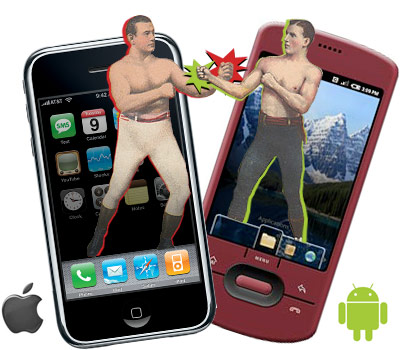What Android can learn from the iPhone OS (Updated)

 Android has more features than iPhone OS, this much we know. But all isn't perfect in Mountain View. There are several things that the Android team can learn from the iPhone OS. I outlined some of them in March in 5 ways the iPhone beats the Nexus One, but two months is an eternity in mobile tech so here's an updated list:
Android has more features than iPhone OS, this much we know. But all isn't perfect in Mountain View. There are several things that the Android team can learn from the iPhone OS. I outlined some of them in March in 5 ways the iPhone beats the Nexus One, but two months is an eternity in mobile tech so here's an updated list:
1. App Store/total number of apps. Selection is important and the App Store simply has about 4x more apps (200k vs. 50k). No one loves Apple's opaque and arbitrary approval process, but at the end of the day 80% of consumers care about selection.
2. Customer service. Apple has it, Google doesn't. Pretty irrefutable. Bonus points for Apple because it doesn't offshore/outsource its call centers. [update: Individual manufacturers give customer support to their own phones, as does Google for the Nexus One.]
3. Consistency. The iPhone OS is pretty much identical whether you're using it on an iPod touch, iPhone or iPad. Sure there are hardware differences in newer models (GPS, compass, video recording, etc.) but if you use one, you're immediately at home on the other. The Sense UI is completely different than vanilla Android and there's a learning curve. Point Apple.
4. Fragmentation. Apps distributed in the App Store behave pretty much the same across all iDevices. Performance will differ between models, but most apps will run on all devices. Google brags about Android's number of devices and carriers but the side effect is fragmentation. "If you're using a Droid, be sure to download our Droid version!" Google is addressing this by only displaying apps compatible with your device when in the Google Market, but is this a good thing?
5. Software Updates. Apple releases its iPhone OS updates simultaneously for all devices, Android, not so much. Witness Froyo/Android 2.2, Nexus One users are getting it now, but devices running Sense UI (a.k.a. HTC Incredible) are getting it in the "second half of 2010." Seriously? (Ok, this one probably belongs under #4 Fragmentation above.)
6. Copy & paste. Apple took forever to deliver it, but it works really well. Android has had it forever but it's a kludge to the point that I don't use it. Also copy and paste doesn't work in Gmail. Freal? [update: While Android copy and paste is a pain to use, the Gmail app supports it as of android 2.2]
7. Media player. Apple's built-in iPod app beats Android's Music app handily because it includes support for podcasts and videos built in. However, Android 2.2 includes support for Android Music Streaming Service (from its acquisition of Simplify Media) so I could be convinced to call this one a push. [update: The Android Gallery app can play videos from the SD card]
8. Ease of use/simplicity/user experience/integration. And this is a big one. The iPhone "just works" for most people, Android is a little less seamless and can be more daunting to novice users. This can and will be debated by most readers here, but keep in mind: you are probably not a novice user if you're reading ZDNet blogs. At least that what management tells me. [update: While ease of use and simplicity could be well improved in Android, it is very well integrated both in terms of other web services such as Facebook, twitter and last.fm integration through the sync and accounts API, and with Google's own services.]
9. A true unified inbox. To be fair, this isn't coming until iPhone 4.0, but I installed the developer build on my iPhone 3GS just for this feature and it's fabulous. Android has separate apps for Gmail and Mail. Fail.
10. Skype. - Skype for Android only works on Verizon devices and doesn't work on WiFi. To make matters worse domestic Skype calls are carried over the Verizon network and are billed like a normal mobile phone call. However, even though Apple and AT&T lifted the ban and now allows VOIP clients to work on 3G, Skype for iPhone still only works on WiFi - so, call this one a push? (Oh wait, Skype for iPhone doesn't have push either.) Truphone and Fring, are better options on the iPhone.
Some would say that Apple is better at hardware design, but I think that HTC handsets like the Nexus One and the Incredible are as good or better than the iPhone. One you have those four extra buttons (especially the back button) using an iPhone is incredibly frustrating. I also had "touchscreen sensitivity" on my original list because the lower fifth of my Nexus One's touchscreen had a profound deafness problem but this issues appears to be isolated to some N1's.
I also had "backing up and restoring data" on my original list because Apple does this better, but it appears that Google has addressed this with cloud-based data backup for Android applications and MyBackup Pro is a pretty sweet app.
The one feature that stands to set the iPhone apart is video calls. While it's true that the HTC EVO 4G on Sprint has it (via Qik) I'll bet that Apple's implementation will be better.
Did I miss any?
Photo: Rob Jackson for Perivision
[Updates: Numbers 2, 6, 7 and 8 were updated thanks to comments from reader Izu Elechi]